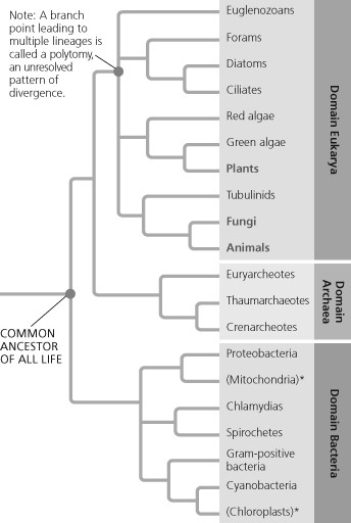
A phylogenetic tree is shown for the three domains of life (Eukarya, Archaea, and Bacteria) . The tree branches in two directions from the first point, labeled Common ancestor of all life. One branch leads in the direction of Eukarya and Archaea, and the other branch leads to Bacteria. The branch leading to Eukarya and Archaea divide, one branch leading to each domain. The branch leading to Eukarya divides into four branches. One leads to Euglenozoans, and the other three lead to branching points. The first leads to Forams in one direction, and another branching point in the other that leads to Diatoms and Ciliates. The second branching point leads to Red algae in one direction, and a branching point that leads to green algae and land plants in the other direction. The third branching point leads to amoebas in one direction, and a branching point that leads to fungi and animals in the other direction. Land plants, Fungi and Animals are all highlighted.
Cyanobacteria were once called blue-green algae because they are photosynthetic. According to the phylogeny shown, the cyanobacteria are more closely related to gram-positive bacteria than to ________.
A) proteobacteria
B) green algae
C) euglenozoans
D) crenarcheotes
Correct Answer:
Verified
Q57: In a comparison of birds and mammals,
Q63: Three living species X, Y, and Z
Q64: To apply parsimony to constructing a phylogenetic
Q66: If you were using cladistics to build
Q67: Imagine that you discovered the following information:
Q68: The following question refers to this phylogenetic
Q69: Based on the tree below, which statement
Unlock this Answer For Free Now!
View this answer and more for free by performing one of the following actions

Scan the QR code to install the App and get 2 free unlocks

Unlock quizzes for free by uploading documents